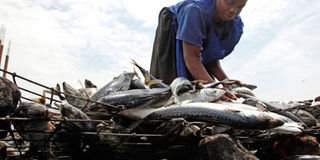Why women need economic empowerment

One way of empowering women economically is by helping them start income generating activities such as selling fish. PHOTO BY RACHEL MABALA
What you need to know:
Women should move beyond household budgeting and start thinking more broadly about their financial status in the future, Annet Katusiime writes
On March 8 of every year, we celebrate International Women’s Day, what comes to your mind? Are you still the one who thinks a man should take on the roles of a woman at home, especially in the kitchen for that day?
Well, I think celebrating womanhood is beyond the daily chores but broader to being financially literate and able to manage their personal finances and their family wellbeing.
Women’s economic empowerment refers to the ability of women to enjoy their right to control and benefit from resources, assets, income and their own time as well as the ability to manage risk and improve their economic status and wellbeing.
One of the ways to empower women is through participation in the household planning and allocation of financial resources to make developments.
Raise a family together by having a family budget and having a plan to save hence make investments that can sustain a family that is why for every successful family behind there will be a hard working mother.
While households are increasingly headed by women with families looking at them to provide, challenges remain for women to enjoy the fruits of their labour because they tend to put their own financial needs on the back burner because they are so busy earning a living and taking care of their families.
Statistics in Uganda show that men are more literate than women and yet women are taking the leadership role in household finances for a number of reasons.
Including culture setting of a woman to be the sole care taker of the wellbeing of a family.
However, women are often guilty of placing the needs of their families before their own and not thinking of the financial consequences of unbudgeted expenses, which will have a big impact on their finances later in life.
I would like to encourage women to move beyond household budgeting and start thinking more broadly about their financial status in the future, women can contribute more to their household’s financial wellbeing in the following ways.
To be part of formulating a family financial plan in which you set out your goals and aspirations for example what kind of investment are you planning for? When do you want to retire? Shared visions become shared responsibilities and help ease the tensions that discussions about finances can cause, especially in the Ugandan setting.
Discuss spending and saving with your spouse or a trusted adviser regularly. This helps you get on track with your finances since everyone has bad financial habits and it’s good to get these out into the open so that you can find ways to solve a problem.
Women should take on responsibilities. Women have often been raised with the mindset that they will be the secondary earners while husbands will take control of the long term financial matters.
Being financially empowered gives you the confidence to plan together as a family without over stressing men ultimately enjoying the fruits of good financial planning benefits of saving, investing and planning for old age.
Learning should be appreciated by women, challenge yourself to know something new daily by reading an inspirational book or quote, once in a while know your bank statement and get financial advice from financial institutions to know the possibility of making use of the products and services available.
It’s wonderful that most banks in Uganda have included women by introducing products and services tailored for only women, this alone is a good indicator that women are well sought about knowing the potential we have to influence the economic development of the country.
SUCCESS TIPS
Challenge yourself. Learning should be appreciated by women, challenge yourself to know something new daily by reading an inspirational book or quote, once in a while know your bank statement and get financial advice from financial institutions to know the possibility of making use of the products and services available.
Ms Annet Katusiime is a certified trainer in financial literacy.



